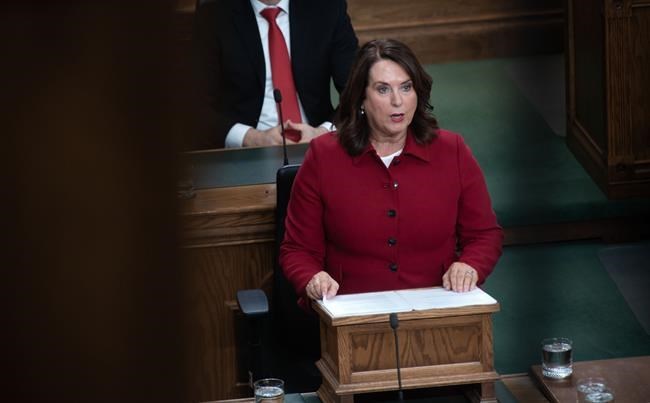ST. JOHN'S, N.L. — Climate scientists say there is no such thing as "low-carbon" oil, despite the Newfoundland and Labrador government's claims that it is produced in the waters off the province’s east coast.
The provincial government has long said its "low-carbon" offshore oil will be part of the global transition away from fossil fuels. Finance Minister Siobhan Coady used the term last week when she presented her budget, which included more than $60 million to expand offshore oil exploration.
But climate scientists across the country say the phrase is misleading, and even nonsensical.
"There is no low-carbon oil," said Damon Matthews, a climate science professor at Concordia University. "It's an oxymoron and a misnomer."
The government's claim is based on the greenhouse gas emissions produced when oil is extracted from the earth.
Matthews said it is true that fewer emissions are produced when oil is extracted from Newfoundland's four offshore oilfields compared to when it is removed from the Alberta oilsands. But extraction emissions are a small percentage of oil's carbon footprint, Matthews said, adding that it's the emissions produced when oil is ultimately burned that are driving climate change.
For example, oil from the Hibernia oilfield off the coast of St. John's produces a total of 487 kilograms of carbon dioxide per barrel, according to an oil-climate index project from the Carnegie Endowment for International Peace, a think tank based in Washington, D.C. Extracting that barrel of oil from the sea floor, however, accounts for a tiny fraction of those emissions. The index says downstream emissions — produced when the oil is ultimately burned as fuel such as gasoline or diesel — accounts for 436 kilograms or 90 per cent of the barrel's emissions.
In the oilsands of Cold Lake, Alta., a barrel of oil produces a total of 667 kilograms of carbon dioxide, 138 of which come from extraction, the index says. Downstream emissions, meanwhile, account for 466 kilograms — virtually the same as a barrel of Newfoundland's offshore oil.
It's accurate to say Newfoundland and Labrador has "lower-carbon" oil compared to the oilsands, said Daniel Scott, a geography professor at the University of Waterloo. "But ‘low carbon’ is perhaps not the best phrase, as no fossil fuel … is part of the ‘low-carbon’ transition that governments have committed to under the Paris Climate Agreement," Scott said in an email.
"Low-carbon transitions move away from fossil fuels to renewables or other low-carbon energy like nuclear electricity."
Canada is among approximately 195 signatories to the Paris Agreement, committing to limiting global temperature increases to well below 2 C, ideally to below 1.5 C.
A report from the Intergovernmental Panel on Climate Change released just three days before the Newfoundland and Labrador government tabled its new budget says global temperatures have already risen by 1.1 C. The report says that left unabated, emissions from the world's existing fossil fuel infrastructure will push temperatures past 1.5 C.
University of British Columbia biologist William Cheung was among the core authors of the document. He said Newfoundland and Labrador's decision to continue financing and encouraging oil exploration goes against the key findings of the report.
"The world needs to go into deep, rapid and sustained mitigations now," Cheung said in an interview, referring to the report's recommendations on greenhouse gas reductions. "And we know that fossil fuel emissions are the largest source of emissions historically and currently contributing to climate change."
He laughed when asked about the province's claims of "low-carbon oil."
"It sounds like they're comparing it with the extraction from oilsands," he said. "But compared to say, renewable energy? Wind power, tidal power? … The use of oil would be much higher in terms of carbon compared those renewable energy sources."
This report by The Canadian Press was first published March 29, 2023.
Sarah Smellie, The Canadian Press



